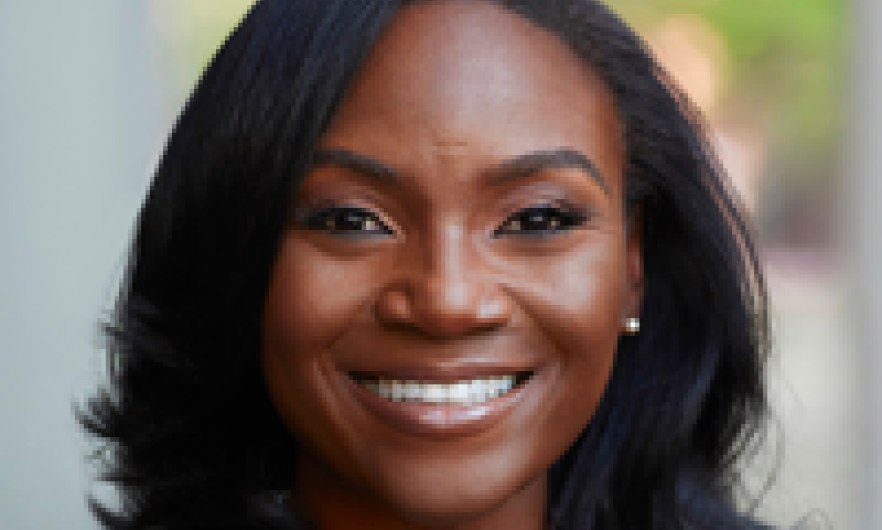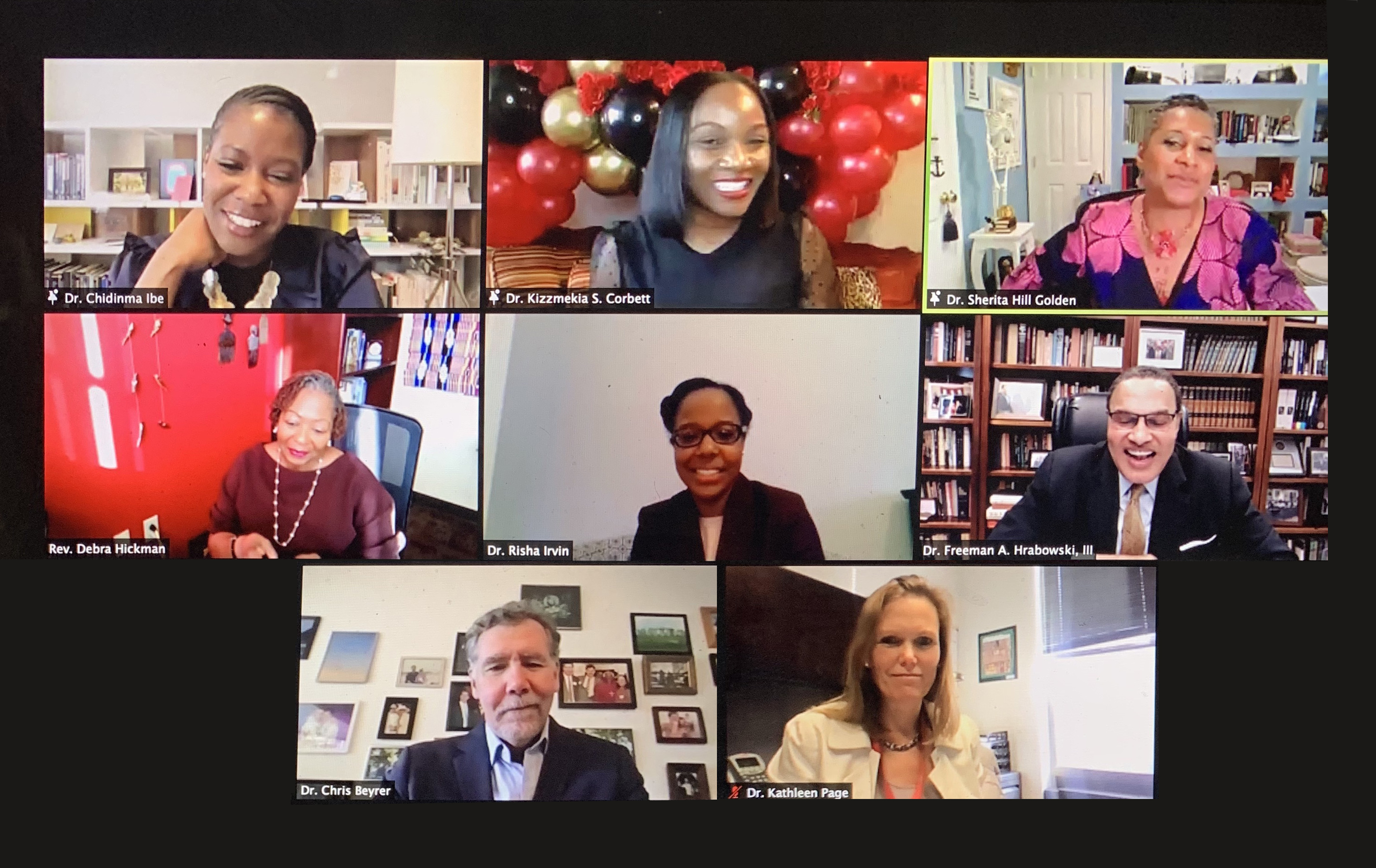Community Forum With Dr. Kizzmekia Corbett: Everything You Should Know About the COVID-19 Vaccines

"Vaccination is a community service”, shared Dr. Kizzmekia Corbett, scientific lead for the Coronavirus Vaccine Team at the National Institute of Allergy and Infectious Diseases (NIAID) during the community forum we hosted about COVID-19 vaccines in partnership with the Office of Diversity, Inclusion, and Health Equity, Center for Health Equity, Center for Health Disparities Solutions, Center for Immunization Research, Johns Hopkins Vaccine Initiative, and Center for Public Health and Human Rights. To hear the full discussion, click below to watch the recording of the event on our YouTube channel, here.

Dr. Corbett spoke to over 1400 attendees from across Baltimore and beyond including: Canada, Colombia, Ethiopia, Kenya, Republic of Korea, Nigeria, South Africa, and United Arab Emirates, in detail about the process she and her team at NIAID went through to develop and test the COVID-19 vaccine, Moderna (mRNA-1273).
At the beginning of 2020, when it became clear this novel virus was spreading rapidly around the globe, Dr. Corbett and her team immediately got to work. Research for various strains of the Coronavirus started back in 2013 which provided a foundation for rapid vaccine development. When testing the efficacy of the vaccine, clinical trial volunteers were carefully selected to represent diverse communities and sub-groups including Hispanic/Latinx, Black/African American, Asian American, and those with chronic diseases – such as diabetes.
“A lot of the side effects that people feel after the first dose, are similar to what you feel when you get a flu shot each year.”, shared Dr. Corbett when describing some of the symptoms those who are vaccinated might experience. About 80% of those who receive the vaccine have experienced side effects including: fatigue, soreness at the injection site, fever, headache, and chills. "This indicates that everything is going correctly. You are eliciting a good immune response to the vaccine”, explained Dr. Corbett.
A panelist of community leaders and public health experts joined us to share personal testimonies, their perspective about the vaccine, and how the communities they serve are impacted.
“There is a historical precedent in connection to why black and brown communities were so impacted by this pandemic.” explained Dr. Kathleen Page, associate professor in the Division of Infectious Diseases at Johns Hopkins University School of Medicine and co-founder of Johns Hopkins Centro SOL. Dr. Page discussed how those with pre-existing health conditions, such as diabetes, are at risk for becoming ill with COVID-19 and are often a part of communities subject to racial and health disparities.
Panelists spoke about the lack of trust communities of color have in medicine and healthcare. “Of course, there is mistrust. It is understandable if people are suspicious of a system that has not worked for them historically.”, said Dr. Page. Rev. Hickman, founder and director of Sisters Together and Reaching, Inc. (STAR) spoke about the importance of acknowledging traumas in the Black community, such as what happened with Henrietta Lacks, in order to build trust.
Panelists talked about the importance of ensuring marginalized communities receive access to the vaccine and COVID-19 resources. "To get to people we need to be where people are […] I am hopeful, because there are many people in this group who have stepped up to the plate to respond to COVID-19 and these people are a part of the community and we need to leverage them so we can get what we need to get to everyone.”, stated Dr. Page.
Rev. Hickman talked about the efforts she is making to receive information about the vaccine so she can properly educate the communities she serve “I need to be in rooms where all of us on this panel have been so we can take it to the streets, take it to the church, take it inside of a business space, and say these are the facts and these are how we can prove these facts to you. […] we have to come together, and we have to stand together and be respectful of our citizens across the nation, to make it plain and simple and keep it into one message (about the COVID-19 vaccine) and is delivered to every culture.”
Community leaders Dr. Freeman Hrabowski, president of the University of Maryland, Baltimore County and Rev. Debra Hickman both participated in COVID-19 clinical trials and shared what influenced their decisions to do so. “I wanted to honor the souls that have gone on [...] I wanted to leave behind a legacy that we are never fearful because of things people are saying but instead we know the facts”, explained Rev. Debra Hickman. Dr. Freeman Hrabowski also shared, "we believe in not only helping ourselves by getting this vaccine, but our children and grandchildren and our parents. This is for all of us”.
Continuing the conversation on community trust, Dr. Corbett emphasized that people should take her word when discussing the validity of the vaccine, "when you don't have trust in something, you don't lend any reason to hold them accountable. What I’ve been suggesting to people is to trust me"
Dr. Hrabowski explained the significance of seeing a Black scientist leading the charge for COVID-19 vaccinations. “Most Americans have never seen a Black woman standing in front of a national audience saying she is leading a team in the development of a vaccine […] it makes a difference when you see someone looking like you involved in the development of this vaccine”
Dr. Chidinma A. Ibe, director of Stakeholder Engagement at the Johns Hopkins Center for Health Equity, ended the event with a call to action, "I want to charge all of us to center accurate scientific information in the work we are doing."
Additional tips shared by Dr. Kizzmekia Corbett at the forum included:
-
Until 60-70% population immunity is established, it is unlikely for COVID-19 to be controlled.
-
If a person has had COVID-19 they should still get vaccinated.
-
De-risking should be the science behind policy decisions
-
Even if you are vaccinated you should continue to wear your mask
A special thank you to our co-sponsors: Johns Hopkins Medicine Office of Diversity, Inclusion, and Health Equity, Johns Hopkins Center for Health Equity, Center for Health Disparities Solutions, Center for Immunization Research, Johns Hopkins Vaccine Initiative, and Center for Public Health and Human Rights.
